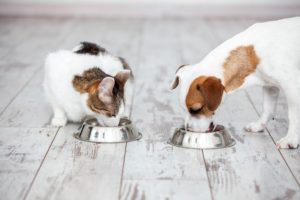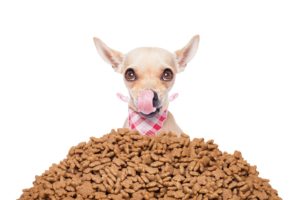8:28 pm

People evaluate their diet and exercise habits, and resolve to make healthy changes, every New Year. Responsible pet owners also make good choices to keep their furry friends healthy. Include your pet in your resolutions to ensure she enjoys a long life by your side, starting by assessing your pet’s diet, since more than 50% of dogs and cats are overweight. If a diet overhaul is in order, start the New Year off right by following these guidelines:
Your dog or cat should eat a commercial pet food designed to keep her healthy throughout her life, but with aisles of choices, choosing the perfect product can be challenging. With so many factors to consider, follow these basic tips:

Overfeeding is the most likely obesity culprit, yet many pet owners fail to measure their pet’s food. Pets should not be free-fed (i.e., their food bowl filled whenever it is empty), because most will overeat and become overweight. To determine the appropriate amount to feed your pet, weigh her, and refer to the package instructions for a specific food amount. For a more accurate determination, ask your family veterinarian to calculate your pet’s energy requirement, which is based on her weight, body condition, and life stage. Then, convert the calculated daily calorie intake to a cup measurement that you divide into two daily feedings. At each meal, use a measuring cup to ensure you do not overfeed your pet.
Suggesting that pet owners forego giving treats to their pets is simply not reasonable. Like snacking between meals, treats are OK, but you must subtract the calories from your pet’s daily allotment and feed her less at mealtime. Limit your pet to only a few store-bought treats each day, as most are high in calories. Feed your pet healthier options, such as fresh fruits and vegetables, which pack fewer calories, so she can enjoy more throughout the day. Dogs often enjoy raw carrots and green beans as much as dog biscuits, and many cats like pumpkin and cantaloupe.
Feeding a few bites of healthy vegetables or lean meat may be acceptable, but most human foods are high in fat and calories and are not only unhealthy for your pet, but also can make her ill. For example, rich, fatty foods can cause pancreatitis, which often requires hospitalization for resolution, and other human foods, such as grapes, chocolate, and sugar-free candy, are toxic to pets and can cause life-threatening illness, so sticking to pet food is safest.
If you have questions about your pet’s diet, consult your family veterinarian to discuss healthy food options.